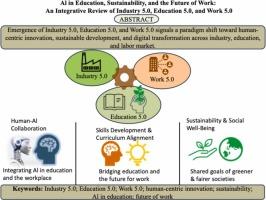人工智能在教育、可持续性和工作的未来:工业5.0、教育5.0和工作5.0的综合回顾
Q1 Economics, Econometrics and Finance
Journal of Open Innovation: Technology, Market, and Complexity
Pub Date : 2025-09-24
DOI:10.1016/j.joitmc.2025.100645
引用次数: 0
摘要
工业5.0、教育5.0和工作5.0经常被孤立地讨论;这篇综合综述展示了它们如何凝聚成一个以人为本、与可持续发展相一致的人工智能转型模型。本研究回顾了来自Scopus、Web of Science、b谷歌Scholar和政策门户(EC、UNESCO、ILO、WEF)的200条记录(包括62条),以研究这三个领域如何作为一个统一的范式相交。通过对实证研究和政策报告的综合文献回顾和质量评估,我们确定了三个跨领域的主题:(1)人类与人工智能的合作,将自动化从替代转向增强;(2)由教育5.0引领的技能发展路径,连接教育、产业和劳动力;(3)可持续性作为生态、社会和经济维度的统一规范锚。研究结果显示了好处(人体工程学、课程与行业的一致性、绿色工作)和风险(去技能化、不平等、反弹效应)。该框架的贡献在于阐明了共享的中介(技能、道德、可持续性),揭示了矛盾(自动化与包容),并提出了以人为中心的治理条件。主要影响包括根据可持续发展目标一致的战略调整创新政策、课程改革和劳动保护,以及试点衡量福祉、公平和生产力的指标。本文章由计算机程序翻译,如有差异,请以英文原文为准。

AI in education, sustainability, and the future of work: An integrative review of industry 5.0, education 5.0, and work 5.0
Industry 5.0, Education 5.0, and Work 5.0 are often discussed in silos; this integrative review shows how they cohere into a human-centric, sustainability-aligned model of AI-enabled transformation. This study reviews 200 records (62 included) from Scopus, Web of Science, Google Scholar, and policy portals (EC, UNESCO, ILO, WEF) to examine how these three domains intersect as a unified paradigm. Using an integrative literature review with quality appraisal of empirical studies and policy reports, we identify three cross-domain themes: (1) human-AI collaboration that reorients automation from substitution to augmentation, (2) skills development pathways led by Education 5.0 that bridge education, industry, and labor, and (3) sustainability as a unifying normative anchor across ecological, social, and economic dimensions. Findings show benefits (ergonomics, curriculum-industry alignment, green jobs) and risks (deskilling, inequality, rebound effects). The framework contributes by clarifying shared mediators (skills, ethics, sustainability), surfacing contradictions (automation vs. inclusion), and proposing governance conditions for human-centric outcomes. Major implications include aligning innovation policy, curriculum reform, and labour protections under SDG-coherent strategies, and piloting metrics that capture well-being, equity, and productivity.
求助全文
通过发布文献求助,成功后即可免费获取论文全文。
去求助
来源期刊

Journal of Open Innovation: Technology, Market, and Complexity
Economics, Econometrics and Finance-Economics, Econometrics and Finance (all)
CiteScore
11.00
自引率
0.00%
发文量
196
审稿时长
1 day
 求助内容:
求助内容: 应助结果提醒方式:
应助结果提醒方式:


